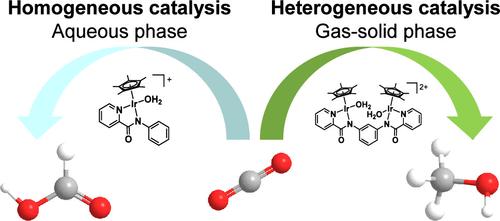Toward Methanol Production by CO2 Hydrogenation beyond Formic Acid Formation
IF 16.4
1区 化学
Q1 CHEMISTRY, MULTIDISCIPLINARY
引用次数: 0
Abstract
The Paradigm shift in considering CO2 as an alternative carbon feedstock as opposed to a waste product has recently prompted intense research activities. The implementation of CO2 utilization may be achieved by designing highly efficient catalysts, exploring processes that minimize energy consumption and simplifying product purification and separation. Among possible target products derived from CO2, methanol is highly valuable because it can be used in various chemical feedstocks and as a fuel. Although it is currently produced on a plant scale by heterogeneous catalysis using a Cu/ZnO-based catalyst, a limited theoretical conversion ratio at high reaction temperatures remains an issue. In addition, a catalytic system that can be adjusted to accommodate a variable renewable energy source for the synthesis of methanol is more desirable than current continuous-operation systems, which require a reliable energy supply. Recently, significant progress has been made in the field of homogeneous catalysis, which primarily relies on an indirect route to synthesize methanol via the hydrogenation of carbonate or formate derivatives in the presence of additives and solvents. However, homogeneous catalysis is inappropriate for industrial-scale methanol production because of the inefficient separation and purification processes involved.

通过二氧化碳加氢生产甲醇,超越甲酸形成过程
将二氧化碳视为替代碳原料而非废品的范式转变最近引发了激烈的研究活动。二氧化碳的利用可以通过设计高效催化剂、探索能耗最小化的工艺以及简化产品提纯和分离来实现。在二氧化碳可能衍生的目标产品中,甲醇具有很高的价值,因为它可用于各种化学原料和燃料。尽管目前已通过使用基于 Cu/ZnO 催化剂的异相催化技术在工厂规模上生产甲醇,但在高反应温度下有限的理论转化率仍是一个问题。此外,与目前需要可靠能源供应的连续运行系统相比,可调节以适应可变可再生能源的甲醇合成催化系统更为理想。最近,均相催化领域取得了重大进展,主要是通过碳酸盐或甲酸酯衍生物在添加剂和溶剂存在下发生氢化反应的间接途径合成甲醇。然而,均相催化不适合工业规模的甲醇生产,因为其中涉及的分离和提纯过程效率低下。
本文章由计算机程序翻译,如有差异,请以英文原文为准。
求助全文
约1分钟内获得全文
求助全文
来源期刊

Accounts of Chemical Research
化学-化学综合
CiteScore
31.40
自引率
1.10%
发文量
312
审稿时长
2 months
期刊介绍:
Accounts of Chemical Research presents short, concise and critical articles offering easy-to-read overviews of basic research and applications in all areas of chemistry and biochemistry. These short reviews focus on research from the author’s own laboratory and are designed to teach the reader about a research project. In addition, Accounts of Chemical Research publishes commentaries that give an informed opinion on a current research problem. Special Issues online are devoted to a single topic of unusual activity and significance.
Accounts of Chemical Research replaces the traditional article abstract with an article "Conspectus." These entries synopsize the research affording the reader a closer look at the content and significance of an article. Through this provision of a more detailed description of the article contents, the Conspectus enhances the article's discoverability by search engines and the exposure for the research.
文献相关原料
| 公司名称 | 产品信息 | 采购帮参考价格 |
|---|
 求助内容:
求助内容: 应助结果提醒方式:
应助结果提醒方式:


